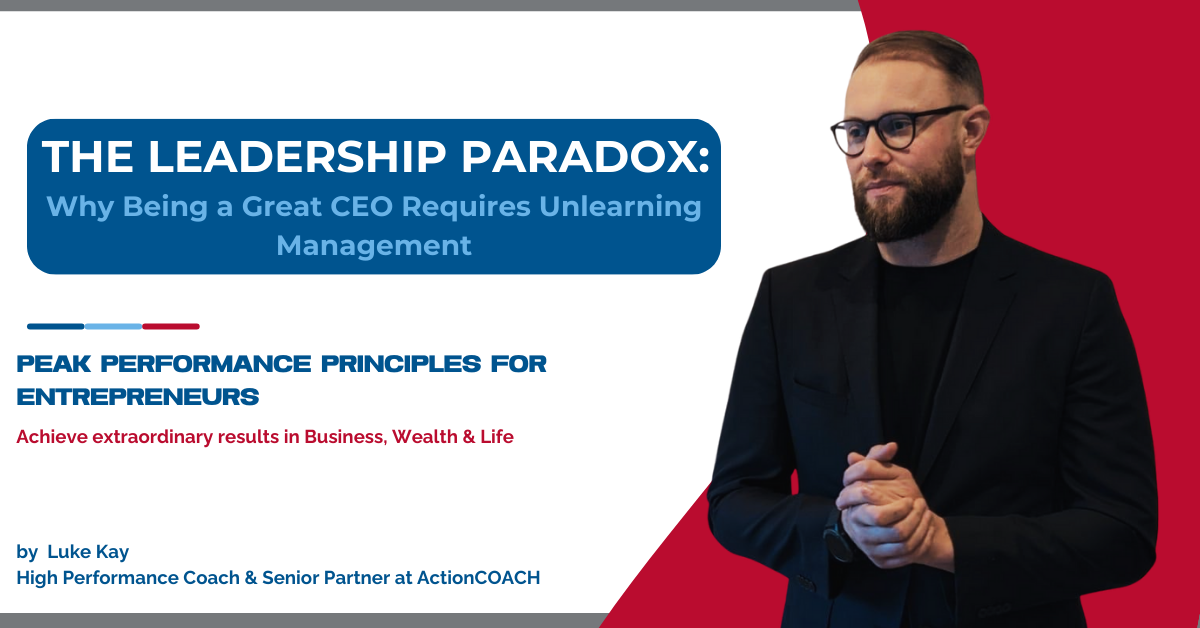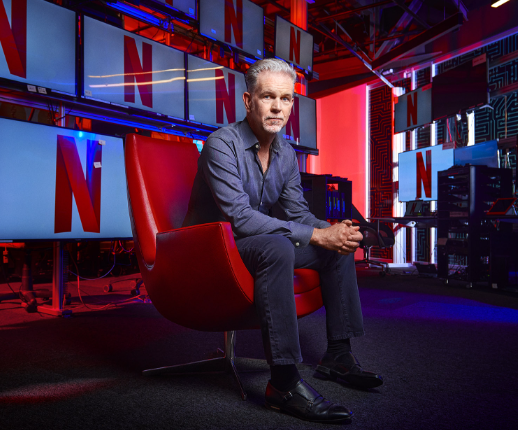
In the journey to the top of the corporate ladder, many CEOs find themselves facing an unexpected challenge: the very management skills that propelled them to success may now be holding them back.
This phenomenon, which I call the “Leadership Paradox,” requires executives to unlearn deeply ingrained management habits and embrace a new paradigm of leadership. Let’s explore why this paradox exists and how to overcome it.
Peak Performance Principle #1: Shift from Control to Empowerment
Traditional management often emphasises control – setting strict guidelines, closely monitoring performance, and making most decisions. However, at the CEO level, this approach can stifle innovation and limit organisational agility.
Great CEOs understand that their role is not to control but to empower. This means creating an environment where team members feel trusted to make decisions, take calculated risks, and innovate. It’s about setting the vision and then giving your team the freedom to figure out how to get there.

Peak Performance Case Study: Google’s 20% Time
When Google was rapidly growing, cofounders Larry Page and Sergey Brin implemented a policy called “20% time.” This allowed engineers to spend 20% of their work time on projects that interested them personally, even if they weren’t part of their official responsibilities.
This empowerment-focused approach led to the creation of some of Google’s most successful products, including Gmail, Google News, and AdSense. By unlearning the traditional management approach of strict control, Google encouraged an environment of innovation that drove significant business growth.

Peak Performance Principle #2: Focus on Outcomes, Not Processes
As managers climb the corporate ladder, they often become experts in processes and procedures. However, CEOs need to shift their focus from how things are done to what is being achieved.
This principle involves setting clear, measurable outcomes and giving your team the autonomy to determine the best way to achieve them. It requires trust in your team’s capabilities and a willingness to accept that there might be multiple paths to success.

Peak Performance Case Study: Netflix’s No-Rules Policy
Netflix CEO Reed Hastings took this principle to an extreme by implementing a “no rules” policy. The company famously has no set working hours, no vacation policy, and no formal review process. Instead, they focus intensely on outcomes.
This approach required Hastings to unlearn traditional management practices and trust his employees to manage themselves. The result? Netflix has become one of the most innovative and successful companies in the entertainment industry, with a culture that attracts top talent and drives continuous innovation.

Peak Performance Principle #3: Cultivate Strategic Thinking Over Tactical Execution
While middle managers often excel at tactical execution, CEOs need to elevate their thinking to a strategic level. This means looking beyond quarterly results to envision the company’s long-term future and position in the market.
Promoting and advancing strategic thinking involves regularly stepping back from day-to-day operations, analysing industry trends, and considering how to create sustainable competitive advantage.
It’s about asking “why” and “what if” rather than just “how” and “when.”
 Peak Performance Case Study: Amazon’s Long-Term Orientation
Peak Performance Case Study: Amazon’s Long-Term Orientation
Jeff Bezos, founder of Amazon, is renowned for his strategic, long-term thinking. In the early 2000s, when most e-commerce companies were focused on short-term profitability, Bezos made the controversial decision to invest heavily in infrastructure and customer experience, often at the expense of immediate profits.
This strategic approach, which required unlearning the typical management focus on short-term metrics, allowed Amazon to build a robust platform that could support explosive growth. Today, Amazon is one of the world’s most valuable companies, largely due to Bezos’s ability to think and plan strategically for the long term.
Peak Performance Principle #4: Embrace Ambiguity and Uncertainty
Managers are often trained to eliminate ambiguity and create certainty. However, in today’s rapidly changing business environment, CEOs need to become comfortable with uncertainty and able to make decisions with incomplete information.
This principle involves developing the ability to manoeuvre complex, ambiguous situations without becoming paralysed by the need for perfect information. It’s about making calculated risks and being adaptable in the face of change.

Peak Performance Case Study: Satya Nadella’s Transformation of Microsoft
When Satya Nadella took over as CEO of Microsoft in 2014, the company was facing an uncertain future in a rapidly changing tech landscape. Instead of trying to eliminate this uncertainty, Nadella embraced it.
He shifted Microsoft’s focus from its traditional Windows-centric approach to a “cloud-first, mobile-first” strategy, even though this meant cannibalising some of Microsoft’s existing business. This willingness to embrace ambiguity and make bold moves in uncertain times has led to a remarkable turnaround, with Microsoft’s market cap growing from around +/- £233.19 billion in 2014 to over +/- £1.554.trillion by 2021.
Peak Performance Principle #5: Prioritise Cultural Leadership Over Operational Management
While managers focus on operations, great CEOs understand that their most important role is shaping the company’s culture. This involves articulating and embodying the company’s values, fostering an environment that attracts and retains top talent, and creating a sense of purpose that motivates employees at all levels.
Cultural leadership requires CEOs to be visible, approachable, and consistent in their actions and communications. It’s about setting the tone for the entire organisation and ensuring that every decision and action aligns with the company’s core values and mission.

Peak Performance Case Study: Yvon Chouinard and Patagonia
Yvon Chouinard, founder of Patagonia, has built a company known for its strong culture and commitment to environmental sustainability. Rather than focusing solely on operational management, Chouinard has prioritised cultural leadership, making bold decisions that sometimes seem to contradict traditional business wisdom.
For instance, Patagonia’s famous “Don’t Buy This Jacket” campaign encouraged consumers to consider the environmental impact of their purchases, even if it meant buying less from Patagonia.
This cultural leadership has created a fiercely loyal customer base and a highly engaged workforce, driving Patagonia’s long-term success and influence far beyond its size.

Implementing the Leadership Paradox
Transitioning from a management mindset to true leadership is not easy. It requires conscious effort, self-reflection, and often, the courage to go against deeply ingrained habits and conventional wisdom.
Here are some steps to start this transition:
- Reflect on your current leadership style. Which management habits might be holding you back?
- Seek feedback from your team and peers about areas where you could provide more empowerment and less direct control.
- Dedicate time each week for strategic thinking and long-term planning.
- Practice making decisions with incomplete information, and learn to communicate your thought process to your team.
- Regularly articulate and embody your company’s values and mission in both words and actions.
Remember, the journey from manager to leader is ongoing. It requires constant learning, adaptation, and a willingness to challenge your own assumptions and habits.
Are you ready to embrace the Leadership Paradox and take your executive performance to the next level?
The first step is recognising which management habits you need to unlearn. What’s one management practice you could start “unlearning” today to become a more effective leader?
Ready to revamp your leadership and take your organisation to new heights? Book a complimentary Session with me. We’ll assess your current leadership style and develop a personalised plan to help you navigate the Leadership Paradox.
Don’t let outdated management habits hold you back – let’s evolve your leadership together!
Our Business Growth Services
We have core 4 business growth services;
- Business Growth Academy for Entrepreneurs of 5 & 6 Figure Revenue Businesses who want to build a 7 Figure Revenue Business and join a community of like minded business owners you can connect and grow alongside.
- 1-2-1 Business Coaching for Entrepreneurs for 7 and 8 Figure Businesses who want to build a 7 Figure Profit Business and Generational Wealth.
- 1-2-1 Executive Coaching for Business Leaders of 8, 9 and 10 Figure Organisations who want to become Even Better All Round Business Leaders.
- Strategic Planning for 8, 9 and 10 Figure Organisations that want to embed Strategic Thinking Execution Planning to get clarity and alignment for your Senior Leadership Team and ultimately Add Zeros to Your Organisation.
Still Not Sure?
If you want to find out more about how we can help you or are not sure which programme is best for you and your organisation feel free to book a complimentary discovery call with myself here.
It should only take 15/20 so I can find out a little more about You and Your Organisation and advise on the next steps.
Book Complimentary Discovery Call
Events
We hold events on a monthly basis as part of our Business Growth Academy and 1-2-1 Business Coaching. If you want to attend one of our events for FREE and meet the rest of the entrepreneurs in our business growth community then please feel free to check out our events page or book onto our next Business Growth Academy Event or 90 Day Planning by clicking on our events page here.

We’re beyond excited to share that ActionCOACH Liverpool has been named the Best Business Consultants in Liverpool by The Legal Directorate UK for 2024!
This amazing honour shows our dedication to helping businesses like yours succeed and grow.
https://liverpool.actioncoach.co.uk/best-business-consultants-in-liverpool/





